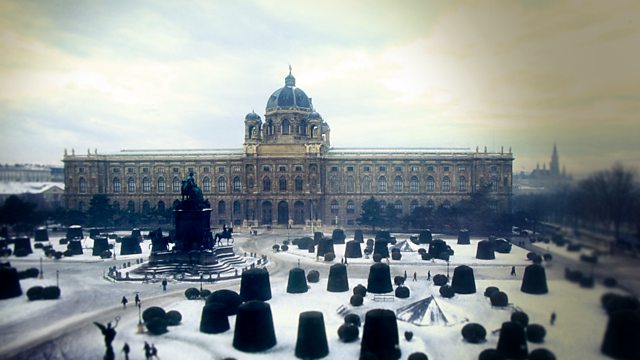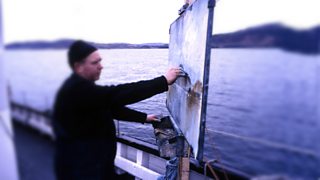
Breaking Free: The World of Yesterday
Anton Lesser and Imogen Stubbs explore Stefan Zweig's Vienna through his elegiac memoir, The World of Yesterday. With music by Johann Strauss, Die Strottern, and Schoenberg.
Part of Radio 3's "Breaking Free - the minds that changed music", exploring the music of the Second Viennese School.
Last on
More episodes
Previous
Music Played
Timings (where shown) are from the start of the programme in hours and minutes
-
GOETHE
An Lottchen (To Charlotte) (extract), read by Imogen Stubbs
![]() 00:00
00:00Karas
Visions Of Vienna
Performer: Anton Karas (zither).- The Very Best of Anton Karas (GBAJC0304241).
- CD1.
STEFAN ZWEIG, trans. Harry Zohn
The World from Yesterday (extract), read by Anton Lesser
![]() 00:00
00:00GODOWSKY
Alt Wien
Performer: Marc-Andre Hamelin (piano).- HYPERION CDA67626.
- 8.
FRANZ WERFEL, ed. Gustave Mathieu & Guy Stern
To the Reader, read by Imogen Stubbs
![]() 00:00
00:00Richard Strauss
Moonlight Music (Capriccio)
Performer: Staatskapelle Dresden, Rudolf Kempe (conductor).- WARNER 4317802.
- 7.
STEFAN ZWEIG, trans. Harry Zohn
The World from Yesterday (extract), read by Anton Lesser
![]() 00:00
00:00EDWARD F. LOCKTON & RUDOLF SIECZYNSKI
Vienna, City Of My Dreams
Performer: Richard Tauber (tenor).- EMI (ISWC: T9000100550).
- 17.
![]() 00:00
00:00Rainer Maria Rilke
Liebes Lied
Performer: Oskar Werner.- RANDOM HOUSE 389830-025-0.
- 6.
RAINER MARIA RILKE, trans. Susan Ranson & Marielle Sutherland
Love Song, read by Imogen Stubbs
![]() 00:00
00:00Fritz Kreisler
Liebesleid
Performer: Fritz Kreisler (violin), Franz Rupp (piano).- EMI CDH 764701-2.
- 5.
![]() 00:00
00:00MAHLER, arr. ALEXANDER SHEVCHENKO & MACIEJ GOLEBIOWSKI
Schoenes Ding
Performer: Alexander Shevchenko (accordion), Maciej Golebiowski (clarinet).- EX815-2.
- 12.
STEFAN ZWEIG, trans. Harry Zohn
The World from Yesterday (extract), read by Anton Lesser
![]() 00:00
00:00ZEMLINSKY
String Quartet No.1 (2nd movement)
Performer: Schoenberg Quartet.- CHAN9772.
- CD1 Tr2.
CHRISTIAN MORGENSTERN, ed. Gustave Mathieu & Guy Stern
The Werewolf, read by Imogen Stubbs and Anton Lesser
![]() 00:00
00:00Anton Webern
4 Pieces for violin, Op.7
Performer: Joseph Szigeti (violin) Roy Bogas (piano).- Philips PHCP 3893.
- 14.
STEFAN ZWEIG, trans. Harry Zohn
The World from Yesterday (extract), read by Anton Lesser
![]() 00:00
00:00Rainer Maria Rilke
Herbsttag
Performer: Oskar Werner (reader).- RANDOM HOUSE 389830-025-0.
- 20.
RAINER MARIA RILKE, trans. C. E. MacIntyre
Autumn Day, read by Imogen Stubbs
![]() 00:00
00:00NONO
Liebeslied
Performer: Wiener Jeunesse-Chor, Gunther Theuring (chorus master), Claudio Abbado (conductor).- DG 429 260.
- 4.
NIETZSCHE, ed. Gustave Mathieu & Guy Stern
Isolated, read by Anton Lesser
![]() 00:00
00:00SCHOENBERG
Piano Pieces, Op.19 No.2
Performer: Neue Wiener Concert Schrammeln.- PR90653.
- 5.
ROTH, trans. Michael Hoffmann
The Emperors Tomb (extract), read by Imogen Stubbs
![]() 00:00
00:00TRADITIONAL VIENNESE
Wann i amal stirb
Performer: Die Strottern.- LC09587 Tr10.
- 10.
LORCA
Little Viennese Waltz, read by Anton Lesser
JAKOB VAN HODDIS, trans. Christopher Middleton
End of the World, read by Imogen Stubbs
![]() 00:00
00:00Gustav Mahler
Ich bin der Welt abhanden gekommen (Rueckert-Lieder)
Performer: Christa Ludwig (mezzo-soprano), Berlin Philharmonic, Herbert von Karajan (conductor).- DG 4593352.
- 8.
DETLEV VON LILIENCRON, ed. Gustave Mathieu & Guy Stern
The Music's Coming, read by Imogen Stubbs and Anton Lesser
![]() 00:01
00:01SCHOENBERG
Gavotte (Suite, Op.25)
Performer: Maurizio Pollini (piano).- DG 423249-2.
- 18.
STEFAN ZWEIG, trans. Harry Zohn
The World from Yesterday (extract), read by Anton Lesser
![]() 00:01
00:01Richard Strauss
Dance of the Seven Veils (Salome)
Performer: Vienna Philharmonic Orchestra, Herbert von Karajan (conductor).- DECCA 417 788-2.
- 9.
RILKE, ed. Gustave Mathieu & Guy Stern
Spanish Dancer, read by Imogen Stubbs
Producer's Note
Stefan Zweig began writing his elegiac memoire, Die Welt von Gestern: Erinnerungen eines Europäers (The World of Yesterday: Memories of a European), in 1934 whilst still living in Vienna. He carried the manuscript into exile via England, finally completing it in Brazil in early 1942.�� His grief over the demise of his Europe through two World Wars was so profound that he committed suicide with his wife, Lotte Altmann, the day after posting The World of Yesterday to his publisher in Stockholm.�� In the preface he wrote:
‘I have never attached so much importance to my own person that I would have been tempted to tell others the story of my life.�� Much had to occur, infinitely more events, catastrophes, and trials than are usually allotted to a single generation had to come to pass, before I found the courage to begin a book in which I was the principal person or, better still, the pivotal point.’
(Stefan Zweig, trans. Harry Zohn; The World of Yesterday, Viking Press)
The World of Yesterday now stands as a literary tour-de-force on fin-de-la-siecle Vienna and the dying days of the Austro-Hungarian Empire.�� Zweig not only paints a nostalgic picture of what he called ‘the world of security’, and explains how the Austro-Hungarian school system was designed to create a sense of stability by supressing the natural curiosity of its youth, but he also gives poignant analyses of how the First World War was triggered in Sarajevo and how the rise of anti-semitism swept across Europe from a humble workers’ demonstration in Vienna, and ultimately how the changing geo-political climate of Central Europe was inexorably driven to the catastrophe of the Second World War.�� Zweig was connected to so many other great literary and cultural names in early 20th-century Vienna, all of whom he mentions in his book: Rainer Maria Rilke, Hugo von Hoffmannsthal, Karl Kraus, Sigmund Freud, Gustav Mahler, Arnold Schoenberg and many others.
In this special edition of Words and Music for Breaking Free – the minds that changed music, Anton Lesser reads extracts from The World of Yesterday that sequentially chronicle the shift in Zweig’s Vienna from the security of 19th-century Hapsburg Rule through the uncertainty of the First World War and into the brave new world of the 1920s, which was expressed in the progressive modernism of the Second Viennese School, the Secessionists and Freudian psychoanalysis.�� Imogen Stubbs joins Anton Lesser in reading poetry on related themes by authors connected to Zweig’s Viennese literary circles.��
Zweig’s idea of the world of security is echoed in Franz Werfel’s appeal to the universality of man in his poem, To the Reader, and Rainer Maria Rilke’s Liebeslied (Love Song).�� This ‘gemütlich’ picture of old Vienna is also captured in the legendary zither playing of Anton Karas, at the beginning of the programme, followed by Godowsky’s Alt Wien, Strauss’ Blue Danube in a version for music box and Fritz Kreisler playing his own Liebesleid.
The endless, unchallenging school days of Zweig’s youth lead to Christian Morgenstern’s The Werewolf accompanied by Zemlinsky’s youthful 1st String Quartet.��
Then the atmosphere darkens as Vienna slips unknowingly toward the First World War and to a new sound-world.�� It is the youth who sense what is coming, says Zweig, and Webern’s Four Pieces for Violin and Piano, Op.7 accompanies Rilke’s Herbsttag (Autumn Day) and Nietzsche’s shockingly bleak poem, Isolated, followed by Schoenberg’s Piano Piece, Op.19 No.2 arranged for traditional Viennese Schrammel-music.�� The immediate confusing aftermath of the war is captured by Joseph Roth in an extract from his novel, The Emperor’s Tomb, followed by the beguiling traditional Viennese song of death, Wann I amal stirb, and Lorca’s Little Viennese Waltz and Jakob van Hoddis’ End of the World with Mahler’s Ich bin der Welt abhanden gekommen. ��
Zweig talks of the ‘violent wrench from the established order of the post-war generation’ and how they were determined to ‘soar into the future’.�� Lilenron’s poem The Music’s Coming is used to express the post-war procession into the new world of sound followed by Schoenberg’s Suite, Op.25 and the intoxicating hedonism of Rilke’s Spanish Dancer and The Dance of the Seven Veils from Richard Strauss’s Salome.Elizabeth Arno (producer)
Broadcast
- New Year's Day 2017 17:30���˿��� Radio 3
Featured in...
![]()
Arts
Creativity, performance, debate



